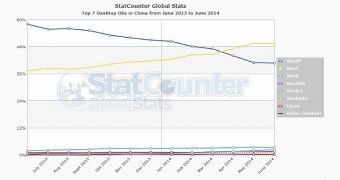China is one of the countries that are planning a mass transition from Windows to Linux, trying to reduce the costs with operating systems by switching from Microsoft software to open-source alternatives.
At the first glance, everything sounds pretty doable, but if we have a look at the statistics provided by web analytics firm across the world, this is very unlikely to happen on the short term.
At this point, Windows continues to dominate the Chinese market and there’s no doubt that it would take years until users not necessarily move to Linux forever, but at least give it a shot to see what it’s up to.
Figures provided to us by StatCounter show that while Windows XP indeed lost some users in China in the last few months, Windows 7 actually improved its market share in a pretty obvious manner, contributing to an overall Windows score of nearly 90 percent.
For example, Windows 7 is said to be powering 49.65 percent of the desktop computers in China, while Windows XP is installed on 40.83 percent of them. Both Windows 8 and 8.1 are far behind with pretty low adoption figures, but it’s still a good thing for Microsoft that its other Windows versions on the market are still there to lead the charts.
Linux, the platform which the government hopes will attract more users, has a market share of only 0.3 percent, which is actually the most obvious sign that switching to an open-source platform all of a sudden isn’t quite the easiest thing to do.
Probably the biggest problem for the Chinese government is piracy. So many consumers running Windows in China are actually using a pirated copy of the operating system, so they see no reason in switching from Microsoft’s software to an open-source alternative. Since they’re not paying anything already, why the rush to another freeware platform that would also require more training?
The matter of security might actually play a much more important role for those who decide to switch, as Microsoft has often been accused for bundling code in Windows that would be used to spy on its users. The company obviously denied all these claims and even called for governments to inspect its source code with the opening of a new transparency center.
In the meantime, China has stepped to a more aggressive push for open-source software by banning Windows 8 on government computers, with some people also saying that Office is no longer available in the country. And still, that doesn’t necessarily mean that users are all ready to give up on Microsoft.

 14 DAY TRIAL //
14 DAY TRIAL //